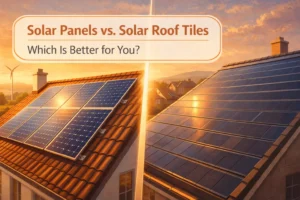Understanding Solar Panel Warranties: What Consumers Should Know

Written By
Published on
- 02 Apr 2025
As solar energy becomes popular across the globe, many people are investing in solar panels to reduce electricity bills and minimise their carbon footprint. However, one key aspect often overlooked during the installation process is the solar panel warranty. In this blog, we will discover what solar panel warranties typically cover, why we need that, and what consumers should take into consideration before making a solar investment.
What Is a Solar Panel Warranty Consumers Can Rely On?
A solar panel warranty homeowners can depend on is a manufacturer or installer’s written guarantee that the system will perform as expected for a specific period. It provides peace of mind and financial protection if the panels or components fail or do not perform as expected.
Why Solar Warranties Matter
Solar panel systems represent an important long-term investment, often lasting 25 years or more. Warranties ensure that if something goes wrong within the period covered in that, the cost of repair or replacement is not a burden on the homeowner. For UK homeowners, this protection is particularly valuable due to the varying weather conditions and general wear and tear over time.
Types of Solar Panel Warranties
There are typically three main types of warranties associated with solar panel systems in the UK:
1. Product Warranty
This type of solar panel warranty homeowners receive covers defects in materials or workmanship of the solar panels themselves. It guarantees that the product will be free from manufacturing faults for a defined period.
2. Performance Warranty
Also referred to as a power output warranty, this ensures that the panels will produce a minimum level of electricity over time. As panels naturally lose efficiency, a performance warranty guarantees they do not degrade faster than a set rate. This solar performance guarantee helps maintain system effectiveness.
3. Installation or Workmanship Warranty
Some installers provide a separate warranty for installation work they perform. This protects against faults caused by poor workmanship, such as water ingress or faulty wiring. It is often referred to as a solar installation warranty.
Key Terms to Understand
When evaluating solar panel warranties, UK homeowners should become familiar with these important terms:
- Degradation Rate: The percentage by which a solar panel’s performance declines annually.
- Warranty Period: The length of time the warranty remains valid.
- Transferability: Whether the warranty can be transferred if the property is sold.
- Claim Process: The steps to follow when making a warranty claim.
How Long Do Solar Panel Warranties Last in the UK?
Typical durations for a solar panel warranty in the UK include:
- Product Warranty: Generally between 10 to 15 years.
- Performance Warranty: Usually lasts around 25 years, guaranteeing 80–90% of the original energy output.
- Installation Warranty: Varies from 2 to 10 years, depending on the installer and the level of solar system guarantees offered.
What’s Covered and What’s Not?
Covered items often include:
- Manufacturing defects
- Excessive performance degradation
- Component failure
- Workmanship issues during installation (if included)
Exclusions may include:
- Weather-related damage such as hail or storms
- Vandalism
- Damage caused by poor maintenance
- Unauthorised system modifications
Tips for Evaluating Solar Panel Warranties
1. Read the Fine Print
Carefully review the warranty terms. Make sure you understand what is covered, what is excluded, and the homeowner’s responsibilities for maintaining coverage.
2. Compare Multiple Quotes
Always compare the warranties offered by different suppliers. A less expensive system might come with less comprehensive protection.
3. Ask About Installation Coverage
Confirm that your installer includes a workmanship warranty. A good install is critical for long-term reliability, and understanding this helps clarify the overall solar warranty explained to you.
4. Check Manufacturer Reputation
Choose well-known brands with proven customer service. If a manufacturer goes out of business, even a strong warranty may be worthless.
5. Understand the Claim Process
Know how to file a warranty claim, including what documentation is needed and how long it typically takes to process. Learn exactly what a solar warranty covers to avoid surprises later.
Do Solar Batteries and Inverters Have Warranties Too?
Yes, other components of a solar power system come with separate warranties:
- Inverter Warranty: Typically 5 to 10 years, which is a common term for solar inverter warranty options.
- Battery Warranty: Usually between 5 and 15 years, depending on usage and manufacturer.
These warranties are crucial to consider when assessing the full cost and protection of your solar investment.
Maintenance and Warranty Validity
Many warranties require routine maintenance to remain valid. UK homeowners should retain maintenance logs and follow care instructions. Failing to meet these requirements can void the warranty. Staying compliant with solar maintenance and warranty guidelines ensures long-term protection.
Transfer of Warranty When Selling a Home
A transferable warranty adds value when selling your property. Confirm whether your solar energy system guarantees can be passed on to new owners and what documentation is needed.
Final Thoughts: Protecting Your Solar Investment with a Strong Solar Panel Warranty
Installing solar panels is an effective way to reduce energy costs and support the environment. But understanding your solar panel warranty is just as important. Consumers should take time to review documentation, ask providers the right questions, and make informed decisions. A reliable solar panel warranty homeowners can trust provides lasting peace of mind and ensures your system delivers returns for years to come.
Need help understanding your solar panel warranty or choosing the right system? Contact our expert team today for personalized guidance and support.
Stay informed. Stay protected. Go solar with confidence.
Solar Panel Warranty FAQs
1. What does a solar panel warranty cover?
A solar panel warranty typically covers defects in materials or workmanship and ensures your panels will perform reliably over time. It’s designed to give you peace of mind that your system will work as expected.
2. What’s the difference between a product warranty and a performance warranty?
A product warranty protects you if there’s something wrong with the panel itself, like a manufacturing defect. A performance warranty ensures that your panels will continue producing electricity at a certain level over the years.
3. If something goes wrong, who do I contact?
You should contact your solar installer. They will help you assess the issue and guide you through the warranty claim process, if needed.
4. Do I have to pay anything if a panel fails?
If the issue is covered under warranty, the panel will be repaired or replaced. Some additional costs, like labor or transport, may not always be included, so it’s good to check with your installer.
5. Does the warranty cover damage from weather or accidents?
Most warranties don’t cover damage caused by external factors like extreme weather, falling branches, or accidents. Those are usually handled by your home insurance.
6. What happens if the company that installed my panels goes out of business?
Even if the installer is no longer around, the panel manufacturer’s warranty may still apply. It’s important to choose reliable companies with a strong track record.
7. Can I transfer the warranty if I sell my home?
In many cases, warranties can be transferred to the new homeowner. This can be a selling point if you ever decide to move.
8. What might void my warranty?
Warranties may be voided if the system is tampered with, damaged through misuse, or not installed by a qualified professional. Always follow the recommended guidelines and use certified technicians.
9. Is regular maintenance required for the warranty to stay valid?
While most warranties don’t require ongoing maintenance, keeping your system clean and in good condition helps ensure long-term performance and may support any future claims.
10. Are other parts of the system, like batteries or inverters, covered by the same warranty?
Usually, components like batteries and inverters come with their own separate warranties. These should be reviewed separately from the solar panel warranty.





